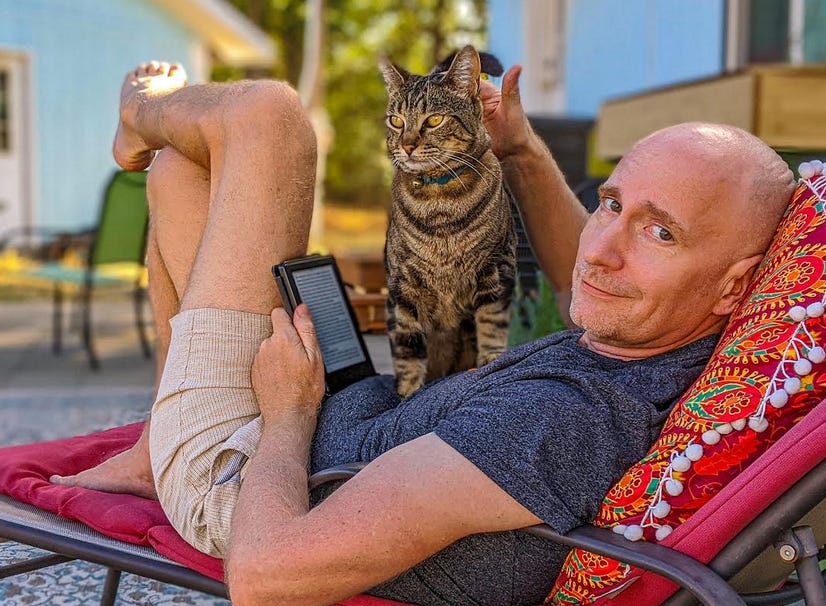The Pros and Cons of House-Sitting
There are some great reasons to do it. But it's definitely not "free lodging."
Spend much time around nomads or long-term travelers, and you’ll soon hear of people doing “house-sitting” — living in someone’s house or apartment while the real occupant is away, usually to take care of pets and do other essential maintenance.
It’s generally either an informal arrangement between friends or family, or it’s a more formal arrangement as a result of online listings on platforms such as TrustedHousesitters.com, where, for a small fee, both homeowners and house-sitters list their availability and make pitches for themselves — and also get reviewed by each other.
Other, smaller platforms include MindMyHouse, Nomador, and HouseSitMatch.
In fact, Brent and I spent much of 2020 — the first year of COVID — doing house-sitting through TrustedHousesitters.
In the eight years we’ve been nomading, we’ve done a number of informal house-sits too — for friends and for people we’ve met online.
But here’s the biggest misconception about house-sitting: Unless it’s an arrangement with close friends or family, it’s anything but “free lodging.”
It’s a business relationship: lodging in exchange for some agreed-upon amount of work.
Part of the problem — at least from the house-sitter’s point of view! — is that the exact amount of work isn’t always clear until you arrive and it’s too late to back out.
(Incidentally, many governments consider house-sits to be actual “work” — something explicitly forbidden in order to be granted many tourist visas. So if you tell the immigration official you are entering a country to do a house-sit, you may very well be denied entry.)
But, of course, there are also plenty of reasons to house-sit.
Let’s look at all the pros and cons, in turn, shall we?
The Pros of House-Sitting:
It’s a good way to save money.
Who doesn’t want to save money? And these days, rents for short-term lodging are climbing fast all over the world, especially for larger or well-appointed spaces.
Some house-sits also provide the use of a car, which is another nice perk.
On the other hand, if the location isn’t convenient and they don’t provide a car, you might need to rent one — an additional expense.
You can end up in interesting locations and situations that you might not otherwise experience.
In 2020, we did a house-sit in Lyle, Washington — a very rural area near the Columbia River Gorge. It wasn’t quite a farm, but farms surrounded us, and we did have a flock of chickens to care for.
We would never have chosen such a place on Airbnb, but we ended up loving it — in part because it was so unusual for us.
Word is, cougars occasionally even traversed the back forty.
Likewise, in 2022, we did an informal housesit for online friends in Croydon, South London — a working-class area of the city about 25 minutes from Central London by train.
This is another place we never would have stayed without the offer. But once again, we loved it — being outside the tourist-heavy areas of London and also experiencing a slice of “typical” Britain that we never otherwise would have seen.
It would’ve been nicer if the trains hadn’t been on strike for much of the two months we were there, constantly being rerouted and delayed. Then again, this was a good look at another typical aspect of life in the UK.
You often get to spend time with adorable, loving pets — and maybe even chickens, pigs, or horses.
Our least favorite part of nomading is the fact that we can no longer have a cat. Brent, who loves cats with the passion of a thousand suns, has been especially deprived.
But house-sitting has given him a chance to spend quality time with some extremely adorable cats.
Meanwhile, while I love cats, I also like dogs — but don’t tell Brent, since that’s a non-starter for him.
And house-sitting has given me a chance to spend time with dogs like Rudy, the Doberman we watched at a house in Seattle. Despite his large size, he was very sweet, and I very much enjoyed our daily walks.
House-sitting gives you a chance to experience other animals too — like those chickens at the place in Lyle, Washington.
In the end, we decided that chickens don’t seem very smart, but they have far more personality than we ever imagined. Years later, we still don’t look at chicken meat the same way — and we’re even more appalled than before by factory farming.
It’s a good opportunity to make new friends.
Typically, before you agree to any “formal” house-sitting arrangement, you Zoom with each other, so the house-sitter can learn about the home, and the homeowner can be assured they’re not inviting a crazy person to take care of their residence.
(Good house-sitting platforms also vet both homeowners and sitters before giving them access, doing background checks and the like.)
If it feels like a good match, the homeowner then usually invites the house-sitter to come a few days before they leave. Once again, this is partly about exchanging information about the home, but it’s mostly about ensuring everyone is comfortable with the entire arrangement.
But living in someone’s home is an intimate thing, and it’s easy to become fast friends.
Better still, if both sides are happy with the arrangement, it’s easy to arrange for future house-sits, not bothering with the online platform.
The Cons of House-Sitting:
It really is work.
I said above that house-sitting isn’t just “free lodging” — it’s lodging in exchange for work.
And sometimes it’s a lot of work — more than is noted in the online listing.
One of our friends showed up at a “farm” house-sit only to discover that he and his wife were suddenly responsible for 250 sheep — and they were given virtually no training.
And not long before one of our house-sits, the owner called us up and said their elderly cat was very sick. Would we mind giving it intravenous fluids once a day?
In the end, the homeowner realized they were asking too much and arranged to have a vet-nurse visit every other day for the intravenous fluids. But we still had to give the cat several daily medications — and both the owner and we were very worried the cat would die during our watch. (It didn’t.)
On the other hand, at that place with the chickens in Lyle, Washington, we had fresh eggs every morning.
You aren’t a guest, and you won’t be treated like one.
When you rent an Airbnb, you generally have the run of the place — and the hosts try hard to make you feel special (in part, so you’ll leave a good review).
But with house-sitting, you’re not a guest — you’re more of an employee.
So, for instance, you probably won’t get the nicest room in the house. You may even get the tiny guest bedroom.
Airbnb hosts are also highly incentivized to provide lots of information about local activities — again, so you’ll leave a good review. Homeowners won’t be nearly as motivated.
And if the homeowner hasn’t arranged for housekeeping before their return, you’re expected to make sure the house is as clean as when you arrived before they get back.
As for online reviews, yes, the homeowner and the house-sitter both review each other, but the balance of power is different from that on Airbnb: the homeowner has much more of it.
In short, their review of you is more important than your review of them; if they have an attractive house, they’ll always get some future inquiries. However, if you, the house-sitter, don’t have all-glowing reviews, most homeowners will opt for someone else.
Some pets are adorable — but some are not.
Brent and I have been surprised by how, in America at least, many people now think of their pets almost like children — sometimes very pampered children.
And those pets will understandably expect to continue to be treated that way.
One of our house-sits had a dog that was, well, an asshole. During our walks, it constantly pulled at its chain and threatened to get into fights with every dog we encountered.
It was actually quite stressful, and I ended up really dreading those walks.
Incidentally, all dogs require multiple walks a day, which means that even day trips away from home may not be an option.
Oh, and don’t get us started on the time during one house-sit that we left an open box of chocolates in a place we never thought a dog could reach — but somehow he did, and almost poisoned himself, and then, based on the homeowners’ advice, we almost blinded the poor animal trying to get him to throw the whole thing back up.
Fun times.
Taking care of a home can be stressful too.
Airbnb hosts expect a certain amount of wear and tear — and they’re usually built to withstand repeated short-term renters anyway.
But a house-sit home may be more fragile, and upon return, the owner will expect to find it exactly the way they left it.
At one house-sit, for example, the owner explained that she had expensive marble countertops in the kitchen. “And marble stains,” she said, “so whatever you do, don’t put blueberries or anything else that might leave a stain on top of it.”
To this day, we still don’t understand why anyone would make kitchen countertops out of a material that stains so easily, but we were constantly worried.
We never did stain them, but ironically, my overheating laptop did leave a scorch mark on the laminate of their expensive dining room table.
We offered to pay for the damage, but the homeowners ended up being very understanding. However, the whole experience was very stressful and has since made us very wary about house-sitting in really nice homes.
Homeowners can cancel and leave you in the lurch.
Once, we arranged a house-sit to coincide with a family reunion, and we drove halfway across the country to get there.
Three days before our arrival, the homeowner canceled. They offered to put us up at a hotel for two nights, but they still left us with a twelve-day gap to fill. We wound up staying in a very crappy — but still expensive! — extended-stay hotel that left us mightily pissed off at the folks who canceled.
And yes, Airbnb hosts can cancel on you too, but (a) Airbnb offers assistance finding an alternative place, especially on short notice, and (b) there are far more local listings on Airbnb than on TrustedHousesitters, and most house-sits from a house-sitting site are arranged far in advance anyway.
So Should You House-Sit? Will We Continue to House-Sit?
Honestly, it’s complicated.
On the one hand, the above “pros” are very real, and we’ve had some lovely experiences — with people, pets, and cool locations.
On the other hand, it’s usually more work than we expected, and occasionally, it’s been fairly stressful.
So here’s the compromise we’ve come up with between ourselves: we’re open to house-sitting possibilities if it looks like a truly extraordinary experience, or if we’d be doing it in an expensive country — if, say, the monthly rent would otherwise cost us $3000 USD or more.
This way, it’s “worth it” even if it does turn out to be stressful and/or a lot of work.
But if it’s not a truly extraordinary experience — or if the home is located in a country where we can rent a decent place for $1500 USD or less?
We’ll probably just rent.
Michael Jensen is a novelist and editor. For more about me, visit me at MichaelJensen.com.
Brent Hartinger is a screenwriter and author. Check out my new newsletter about my books and movies at www.BrentHartinger.com. And preorder my latest book, below.









I once housesat nine cats. Nine. All with individual care plans. One required a morning dish of evaporated milk. Not unrelated was that said cat was spherical. It looked like it had been blown up with a bicycle pump. I slept in a room with flimsy wooden French doors, and at night, the cats would try to get in, hurling themselves at the doors, meowing frantically, like a horror movie. I was about 20, and terrified of cats. I'm a dog person (apologies to Brent). But I must say that dog looks like it would be banned in Britain, which, unlike the US, doesn't have a powerful pit bull lobby, and I'm relieved it didn't eat you guys.
You touched on it in the article, but the point is worth repeating: if your house sitting gig includes animal care, you're tied to the house's location and you shouldn't expect to do any sightseeing or traveling involving overnight stays away from the house.